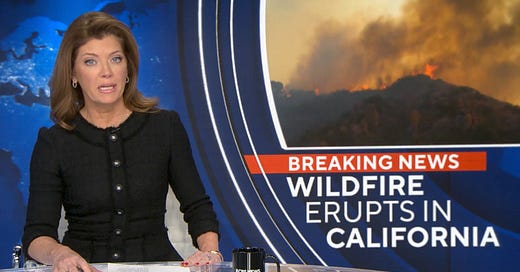ABC, CBS and NBC Evening News Reports on LA Wildfires Ignore Climate Change’s Role Entirely
That climate change is fueling devastating extreme weather events is beyond dispute. Why does corporate media continue to downplay or ignore it?
Last night, the three major networks did reports on the deadly LA fires, and none mentioned climate change’s role in making these large fires more likely and more severe.
CBS Evening News did a 4-minute, 20-second segment, NBC News did a 6-minute segment, and ABC World News did a 5-minute report. None of them mentioned climate change at all. Network nightly news programs are, of course, not the whole of TV media. But they are the networks’ flagship news programs, and a useful sampling of how corporate media editors choose to frame major news events.
This is a common convention of the “extreme weather” genre as climate chaos makes these destructive events more and more common: simply report the human suffering and sensational images, and make no mention of the human causes of the horrors people are seeing on their screen. Strip what is fundamentally a political story of all politics, and index the trauma squarely into the Oh, Dearism genre of passive reporting.
That escalating climate chaos will result in more frequent and devastating wildfires is beyond dispute. As Axios notes today in their explainer, ”LA's wildfires sparked by rare collision of climate factors”:
The wildfires are the result of an unheard-of combination of factors at this time of year — the worst high wind event in Southern California since 2011, plus some of the driest conditions on record for early January.
Downtown LA has received just 0.16 inches of rain since May 6 of last year, making it the second-driest period on record for May 6 to Dec 31, according to the National Weather Service.
January is typically during the region's wet season.
Bone-dry conditions in Southern California contrast with the northern parts of the state, where atmospheric rivers have squelched fire risks.
Even worse, the region had an unusually hot summer that dried out vegetation even further.
…Climate change is intensifying hydroclimate extremes, both wet and dry, including weather whiplash events where California see-saws between the two.
In 2022, a United Nations report concluded that the risk of wildfires around the world will surge as climate change intensifies. According to the New York Times:
It is a stark warning about the increased heat and dryness that human-caused global warming is bringing about. Nations and localities need to prepare better for the dangers, the report’s authors said… “The heating of the planet is turning landscapes into tinderboxes,” said the report, which was published on Wednesday by the United Nations Environment Program. The report, produced by more than 50 researchers from six continents, estimated that the risk worldwide of highly devastating fires could increase by up to 57 percent by the end of the century, primarily because of climate change.
CBS News’s Jonathan Vigliotti, in his report, comes tantalizingly close to mentioning a broader issue at hand, telling viewers, “Southern California has seen back to back to back fires. This one [in reference to images of a fire on screen] just ten miles away from last month’s fire in Malibu. In November, fires destroyed more than 200 structures 30 miles north of here in Ventura country.” But the line of inquiry ends here. There’s a trend, but it’s unclear if anything is causing it. Just really bad luck I guess.
These devastating wildfires are not random acts of God. They are fueled and made far more likely by human-made climate change, a dynamic that will only get worse if those in power fail to act and reverse the US’s record fossil fuel production. But why would politicians and CEOs feel any pressure to respond to these catastrophic events when so few in the media center the role of fossil fuels in the destruction and death? Given the extremely high stakes and the limited timetable, in a sane world, wouldn’t every story about extreme weather events not only mention, but make central, carbon emissions’ role in fueling the destruction?
Connecting the human stakes of out-of-control climate chaos and the often dry science of climate models has been an almost impossible task for climate activists and scientists. Corporate news media—with its focus on one-off human interest and sensationalist images, rather than the why of the story—seems dead-set on making sure it’s a connection that remains largely abstract and impossible to make in the public’s mind.



